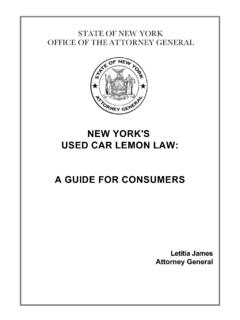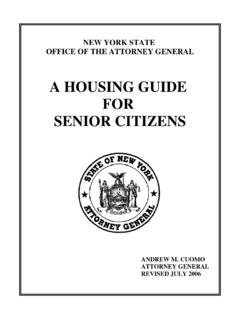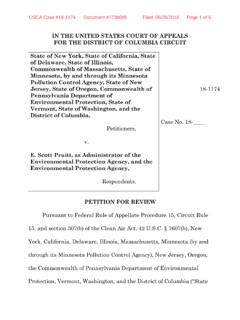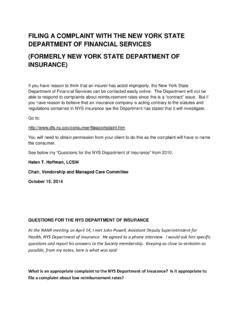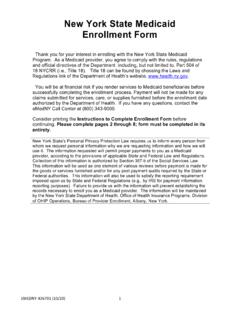Transcription of STATE OF NEW YORK OFFICE OF THE ATTORNEY GENERAL …
1 STATE OF new york . OFFICE OF THE ATTORNEY GENERAL . LETITIA JAMES JANE M. AZIA. ATTORNEY GENERAL BUREAU CHIEF. CONSUMER FRAUDS & PROTECTION BUREAU. March 23, 2022. By First Class Mail To: Major Debt Collector Operating in new york STATE RE: Compliance with new york Consumer Credit Fairness Act and CFPB Regulation F. Dear Debt Collector: As you may know, there have been significant developments at the STATE and federal level to enhance protections for consumers facing debt collection. new york recently adopted the Consumer Credit Fairness Act (chapter 593 of the laws of 2021, hereafter CCFA ), regulating lawsuits from debt collectors, as well as GENERAL Business Law 601-b (chapter 461 of the laws of 2021), regulating debt collector communications with disabled consumers.
2 At the federal level, new rules promulgated by the Consumer Financial Protection Bureau (12 CFR et seq., hereafter Regulation F ), went into effect November 30, 2021. We are sending this letter to confirm that you are aware of these obligations and that you are taking appropriate steps to comply with the new One of the most significant changes is that starting April 7, 2022, the statute of limitations on consumer debt collection actions in new york will be reduced to three years, a period of time that cannot be extended by partial payments made after the statute of limitations has expired (CPLR 214-i). Because validation notices must conspicuously disclose on their face if a debt is time-barred (12 CFR [d][3]; see generally 23 NYCRR ), debt collectors must ensure that validation notices for debts that will become time-barred on April 7, 2022.
3 Include this disclosure if the notice is likely to be received after that date. In addition, debt collectors currently collecting debts that were not, but will become, time-barred on April 7, 1. In addition, we note that the new york Department of Financial Services has proposed amendments to 23 NYCRR. 1 that would impose additional obligations on debt collectors (see new york Department of Financial Services, Proposed Financial Services Regulations, [last accessed March 28, 2022]). As these proposed regulations have yet to be finalized, we do not discuss them further in this letter. 2022, must advise debtors of this fact on or before April 7, 2022. It is a violation of the FDCPA. for a debt collector to bring or threaten to bring legal action whether explicitly or implicitly.
4 Against a consumer to collect a time-barred debt (12 CFR ; see generally 86 Fed Reg 5766, 5781 82 [describing CFPB interpretation of this rule]). In addition, to ensure that consumers understand the nature of the debt that is claimed they owe, new york has expanded the disclosures required by debt collectors proceeding in STATE court. After May 7, 2022, complaints in consumer debt lawsuits must itemize the debt sought and include more details regarding the debt chain of ownership, including attaching the contract on which the debt was ultimately based (CPLR 2016, 3012). In addition, the notice debt collectors must provide to the clerk of court to send on to consumers when filing suit is more comprehensive than the notice previously required under court rules (CPLR 306-d).
5 Debt collectors must also give the clerk of court a new form notice to send to consumers when filing for summary judgment (CPLR 3212[j]). Regulation F sets forth further requirements applicable primarily to debt collection activities prior to litigation. For example, it limits communications with consumers to no more than seven times in seven days and prohibits collection calls between 9 pm and 8 am (12 CFR. ). It also imposes certain obligations designed to ensure that consumers are aware of the nature of the alleged debt and to facilitate consumers' ability to dispute debt and avoid adverse action. Among other things, it requires debt collectors to provide detailed information about the debt (12 CFR [c]); to make initial contact with a consumer before reporting the debt to consumer reporting agencies (12 CFR [a]); and to suspend contact between the time consumers dispute their debt or request information about the original creditor and supplying the requested information (12 CFR ).
6 Regulation F is complemented by new york GENERAL Business Law 601-b, which requires debt collectors, in each initial communication, [to] clearly and conspicuously disclose to the debtor that each communication can be provided in an alternative, reasonably accommodatable, format .. such as large print, braille, audio compact disc, or other means . selected by the debt collector. Request for Information Pursuant to new york Executive Law 63(12) and GENERAL Business Law Articles 22-A. and 22-H, we write to request information concerning your compliance with Regulation F and GENERAL Business Law 601-b, as well as plans to come into compliance with the CCFA. As regards compliance with Regulation F and GENERAL Business Law 601-b please provide: 1.
7 Your current policies and procedures concerning compliance with Regulation F, including but not limited to Regulation F's limits on communications with consumers, requirements for consumer disclosure, and limitations on collections activities. 2. Your current policies and procedures concerning compliance with GENERAL Business Law 601-b, including but not limited to what alternative, reasonably 2. accommodatable formats you have selected to comply with the statute;. 3. Your current policies and procedures concerning compliance with Regulation F's obligation that you do not bring or threaten to bring (implicitly or explicitly) a legal action against a consumer to collect a time-barred debt, including the procedures by which it determines whether debts are time-barred (see 23 NCYRR ) and your definition of what constitutes a threat of legal action, whether express or implied.
8 4. Copies of training materials you use to instruct employees and contractors regarding compliance with Regulation F and GENERAL Business Law 601-b, if any;. 5. Representative samples (omitting or redacting any particular consumer's personally identifiable information), in English and Spanish, of the current form notices and disclosures you provide to a consumer: a. As an initial communication;. b. As a validation notice (if validation information is not provided in the initial communication; if it is, please so STATE );. c. In response to consumer notices of dispute; and, d. In response to consumer requests for original creditor information;2. As regards prospective compliance with the CCFA, please provide: 6. Your current or prospective policies and procedures concerning your intended compliance with the CCFA, including the limitation of the statute of limitations to three years for consumer debt collection lawsuits and the fact that a payment does not restart the relevant time period ( 4), the requirement to provide additional notice of the filing of a collection action ( 5), the requirement to attach the governing agreement to the complaint in a consumer debt collection action ( 7) and the requirement to file an affidavit establishing the chain of title for a debt ( 11).
9 7. A description of the policies, procedures, and practices you have put into place, or is planning to put into place, to ensure that you neither brings nor threatens to bring a legal action on debts that will become time-barred on April 7, 2022 and makes appropriate disclosures to consumers whose debts will become time-barred after April 7, 2022, including the process you intend to employ to identify debts that will become time-barred after that date;. 8. Copies of training materials you have created to ensure that your employees, contractors, and attorneys comply with the CCFA (or, if the training materials have not been created but are intended to be created, a statement to that effect);. 2. If any of these forms do not exist, or exist only in part, please so STATE .
10 If you provide these forms in languages other than English and Spanish, please provide exemplars in those additional languages. 3. 9. If you have not put into place any of the above policies or procedures or trainings, the dates on which you anticipate these measures will be put in place; and, 10. The identity of each ATTORNEY or law firm you employed in the last three years for purposes of filing a consumer debt collection lawsuit in a new york STATE or federal We request that you provide the above information no later than April 6, 2022. Sincerely, Alec Webley Assistant ATTORNEY GENERAL 3. For the purposes of the foregoing question, a consumer debt collection lawsuit includes actions, proceedings, proofs of claim, and any other filing in any new york STATE court, including supreme court, county court, new york City civil court, city courts outside new york City, district court, family court, surrogate's court, and town and village courts, the purpose or effect of which is to establish the existence of or a creditor's entitlement to a debt incurred by a consumer or a consumer's estate.



